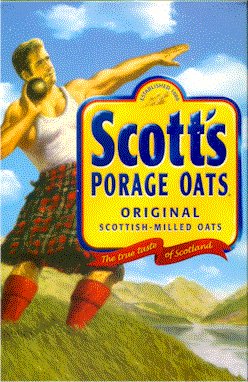Lots Of Porridge May Mean Healthier Heart!
CLAIMS made by generations of Scottish mothers that eating porridge is good for your health may be true after all.
Researchers at three of Aberdeen's leading academic institutions are joining forces to test claims that porridge can help to counter a major Scottish health problem, heart disease.
Researchers from Aberdeen University, the Rowett Research Institute and Robert Gordon University are collaborating in a four-year study.
Dr Frank Thies, a lecturer in human nutrition at Aberdeen University who is leading the study, explained that previous studies suggested that eating wholegrain foods may lower the risk of developing cardiovascular disease and that three servings a day of food such as porridge or oatcakes can help protect the heart. However, these findings have still to be fully validated.
Och! We've bin sayin this fur years! Here's mer info fur yer poarige...
Porridge… "Chief of Scotia's Food' as Rabbie Burns described it - accompanied by a bowl of creamy milk has sustained generations of hardy Scots at home and abroad.
Traditions and myth surround the making of porridge, some say the oatmeal was to be added in batches, some say at the beginning and some say it ought to be added half way through the cooking to produce a nuttier flavour and interesting texture.
Some say porridge should only be stirred in a clock wise direction using the right hand so you don't evoke the 'Devil'.
The stirring is done with a straight wooden spoon /stick without a moulded or flat end and known is Scotland as a 'Spurtle' or 'Theevil'. Porridge should always be spoken of as 'they' and old custom states that it should be eaten standing up. A bone spoon should always be used for eating porridge.
Porridge has various names in the different parts of Scotland:
'lite' leetch-yuh - Gaelic for porridge
'milgruel' in Shetland
'tartan-purry' is the thin porridge made with the liquor in which kale has been cooked.
Some say that porridge should be allowed to stand and than be re-heated, others say that it should be made the day before it is to be eaten.
In older times a 'porridge drawer' in crofters kitchens dressers was filled with fresh cooked porridge and when cold was cut into squares for the crofter to take onto the hills for sustenance. [Maybe the origin of the snack lies here and 'snacking was a Scottish invention as well].
There is a misapprehension that porridge made from meal takes a long time to cook, but be assured it takes only as long as it takes to set the breakfast table.
There is nothing easier and healthier than a bowl of porridge a day - especially in these days of cholesterol reduced diets of modern life and well, Porridge is a great provider of fibre as well.
On top of all this it, "sticks tae yer bones!"
GBYAY


<< Home